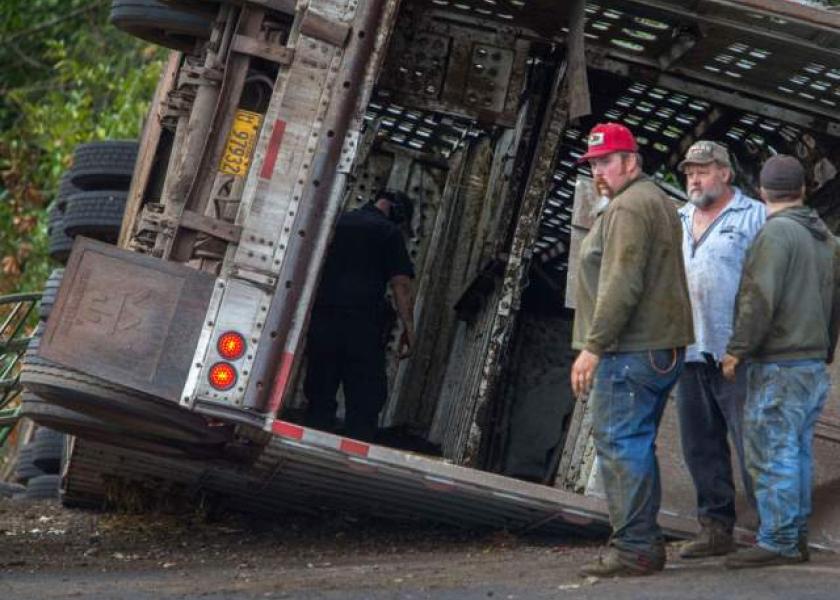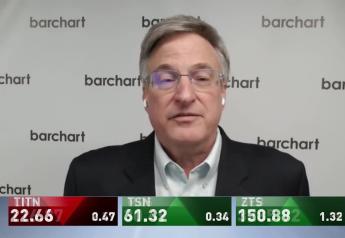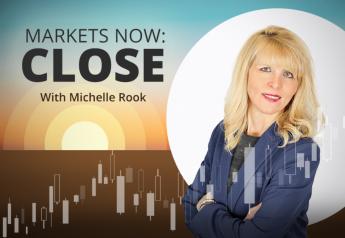Accidents Happen. Don't Lose the Farm Because of Them

It’s well after lunch, mid-afternoon at an all-day grower meeting, but the 20-plus farmers sitting on metal folding chairs arranged in a half circle are focused intently on the speaker in front of them.
“Only 50% to 60% of farmers going down the road hauling a load of hay, driving a semi with grain or some other piece of equipment are doing so legally,” Fred Whitford tells them.
He pauses momentarily, reflects on what he’s just said, then nods his head: “Yeah, I’m pretty comfortable that’s true. It doesn’t take much to be at fault; it could be as simple as driving on bald tires.”
The farmers look around at each other nervously as Whitford builds on his initial comment.
“If I don’t have grooves in my tires I can’t move water, and I can hydroplane. When I go to brake, I don’t have braking power and the truck won’t stop.…What then?”
Maybe the truck just ends up in a ditch. At the other extreme, the driver has a major accident with a motorist that causes death or life-long incapacitation.
It’s not uncommon. Data from the past decade show that while only 19 of every 100 Americans live in rural areas, more than 50% of all fatal roadway accidents take place there, according to the U.S. Department of Transportation.
It’s a heavy topic, but Whitford wades into it, intent on helping the farmers present prepare for if or when calamity strikes.
Pitfalls To Avoid
One common problem is farmers tend to have insufficient insurance, says Whitford, Clinical Engagement Professor, Botany and Plant Pathology and Director of Pesticide Programs at Purdue University.
“Say you have $2 million dollars of liability coverage, which roughly covers your net worth. One of your vehicles is involved in an accident that causes the death of a child.
The jury awards the child’s parents $5 million. Your insurance company would only be responsible for covering the first $2 million, while you would be responsible for the remaining $3 million,” he says. “That could bankrupt your business.”
Whitford brings up another common issue he sees.
“Who has their farm in an LLC?” he asks the group.
A couple of farmers raise their hands. Most are studying the floor. One mumbles that his land and equipment are in a single corporation.
“Well, sir, that’s not a good idea,” Whitford politely tells the farmer. “I can go into the corporation, get all the insurance money and then I can sell the land. I see it happen all the time.”
Whitford tells the farmer to go home and put his land in a corporation separate from his equipment. “You want to protect the one asset that brings you income,” he advises.
“This is why investing the time with an attorney is so vital.”
Whitford also encourages the group to meet with their insurance agent. “Ask them some questions, like ‘How much am I covered for? And what does that mean?’”
Insurance agents often tell Whitford that when they ask their farm clients to come in for an annual review many don’t even return their calls. “Not getting your annual insurance review is lost opportunity to protect your assets,” he says.
He acknowledges a basic insurance policy for the farm is pricey, and there’s no escaping the expense.
However, additional coverage beyond the basic policy is often available at a more palatable rate. Sometimes referred to as an umbrella policy, it provides additional protection that could literally save the farm.
“It often adds $5 million, $10 million of protection on top of your basic policy and at a discounted rate, but insurance agents often don’t bring it up because they know the odds of you buying it are slim,” Whitford says.
Talk, Listen, Act
As part of your annual meeting with your insurance agent, don’t hold back, Whitford tells the farmers in the room.
“Get your agent’s best advice, discuss all of the possible insurance options, then make the best decisions for you and your farm regarding coverage and policy limits,” he says.
While most farmers believe insurance is important, few read their policies. It’s true that an insurance policy is tedious reading, but making an effort to understand what is (and what is not) covered is important.
“After you suffer a loss, it will be too late to make any changes,” Whitford says. “Even if you don’t personally read your policy, at least develop a list of questions you want your insurance agent or attorney to answer.”
More Information Available
Fred Whitford is the author of more than 300 publications. Two of his recent ones are:
The Aftermath of a Farm Truck Crash: Lawsuits, Settlements, and Court Proceedings
Farm Truck Accidents: Considering Your Liability Management Options







